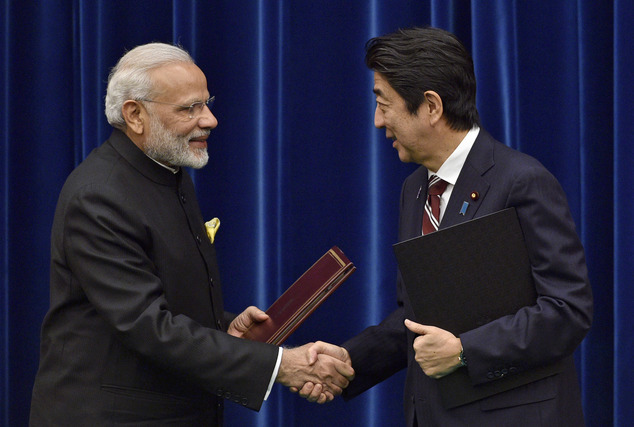Prime Minister Narendra Modi is undertaking two days visit to Japan for the annual summit with his Japanese counterpart Shinzo Abe at the end of October. Though Prime Minister Modi’s Japan visit has very high bilateral significance, what is interesting is that it is taking place just one day after the Japanese Prime Minister’s rare visit to China from October 25 to 27.
According to Chinese Foreign Ministry spokesperson Lu Kang, the Japanese Prime Minister’s visit will mark the 40th anniversary of the Treaty of Peace and Friendship between the two nations. Both India and Japan are concerned about rise in Chinese assertiveness in the South China Sea and Indo-Pacific region. No Japanese Prime Minister has paid official visit to China since 2011, and no Chinese President has visited Japan since 2010. Ties between the two countries headed towards worse in 2012 over a territorial dispute over several small islands in the East China Sea.
It is in this background Prime Minister Modi is making a visit to Japan for the annual summit. The two sides are expected to take up several economic, defence and strategic related issues during Mod’s two-day visit. However, what is significant is that the free and open Indo-Pacific policy which is enshrined in the country’s ‘Act East’ initiative will receive a boost during the visit which will begin from October 28.
In this context, there is likelihood of the two countries signing Acquisition Cross–Serving Agreement (ACSA). The Japanese version of the Logistics Exchange Memorandum of Agreement (LEMOA) of the US, ACSA envisages establishment of basic terms and conditions for the reciprocal provision of supplies and services between the Self Defence Forces of Japan and forces of a foreign country which enters into this basic framework agreement with the former.
After India signs the logistics framework agreement with Japan, the armed forces of the two countries will not only enter into a pact for supplies and services, they will also undertake joint military exercises and training. India will be seventh country after US, Australia, France, UK, Canada and South Korea with which Japan will sign ACSA. DuringAugust 19-20 visit of Japanese Defence Minister Itsunori Onodera, whatever lose ends were there with ACSA were tightened by bringing in effective nuts and bolts, says a senior official familiar with the development. Japan is helping Indian Army in strengthening its cyber command. The two countries are also going to sign deals for the joint production of missiles and other high-tech defence platforms, including much talked about US-2 ShinMaywa amphibious aircraft under ‘Make in India’ programme.
Japan to establish industrial townships in Gujarat, Rajasthan, AP, Tamil Nadu
In April 2018, Japan’s ShinMaywa Industries Limited and India’s private business group, Mahindra had signed Memorandum of Understanding to manufacture and assemble structural parts and components for the US-2 amphibious aircraft. The two countries’ objective to strengthen defence cooperation between them has also direct links with their ambition to secure the Indian Ocean region of any challenges from China. In this context, the two countries have identified over two dozen projects, spread in Africa’s Kenya, Mozambique, Tanzania, Madagascar, Mauritius, Seychelles, Egypt and Comoros to be completed on the priority basis. As per sources, these projects are in agriculture, health, energy and infrastructure sectors.
Gita Gopinath is right: Demonetisation is not recommendable, either in theory or in practice
To impart thrust in their attempts to alleviate African countries of hunger, malnutrition, high child and women mortality, they are also planning to be part of the Comprehensive Africa Agricultural Development Programme (CAADP), an African Union-led framework that brings together African agricultural research institutes, farmers’ association, governments and private sector. Armed with their expertise and knowledge in agricultural and horticultural areas, Indian and Japanese agricultural institutes, scientists are stated to partner with CAADP to write a new script in food production and to fight off hunger. Since Japan is gearing up to conduct seventh Tokyo International Conference on African Development in Yokohama from August 28 to 30, 2019, there is likelihood of India-Japan joint statement to be issued during Modi’s visit reflected the two countries “robust” plan to counter China’s influence in the continent. Experts say in contrast to Chinese model of investments in Africa, India’s model is transparent, inclusive and people-oriented. It has no plan to burden any African nation with big infra project. It is sensitive to their requirements and in consonance with this, the country will invest in areas which rid Africans of their poverty, hunger, illiteracy and diseases. It has though been not confirmed, there is a buzz that India and Japan may come together to set up institutes of manufacturing (IM) in Kenya and Mozambique.
Canadian Leader of Opposition Andrew Scheer meets PM Modi
Nonetheless, the forthcoming visit of the Indian Prime Minister is considered very significant as the two countries are expected to sign agreements for big ticket projects, including further expansion of connectivity projects in India’s Northeast region.
Disclaimer: The opinions expressed in this article are the personal opinions of the author. The facts and opinions appearing in the article do not reflect the views of NEWSD and NEWSD does not assume any responsibility or liability for the same.


















